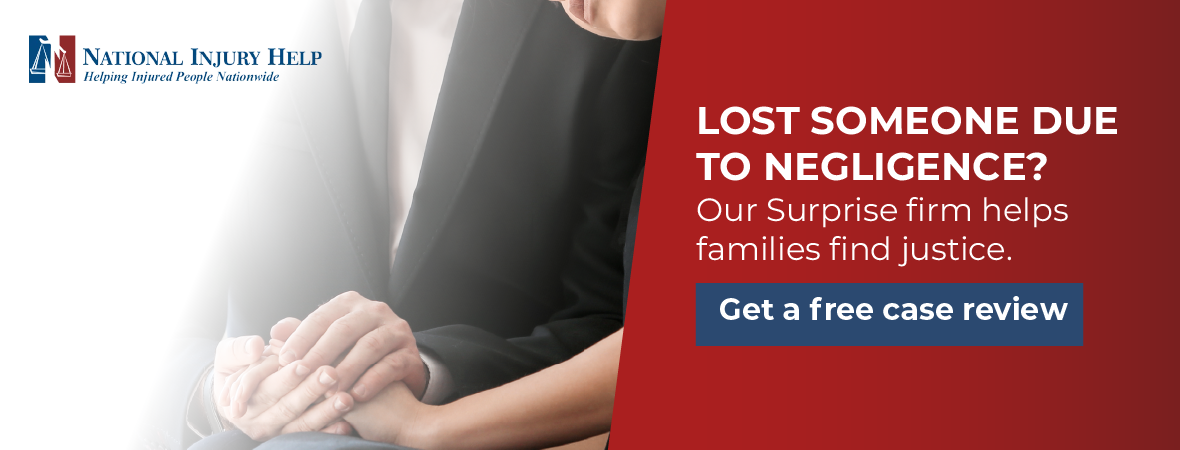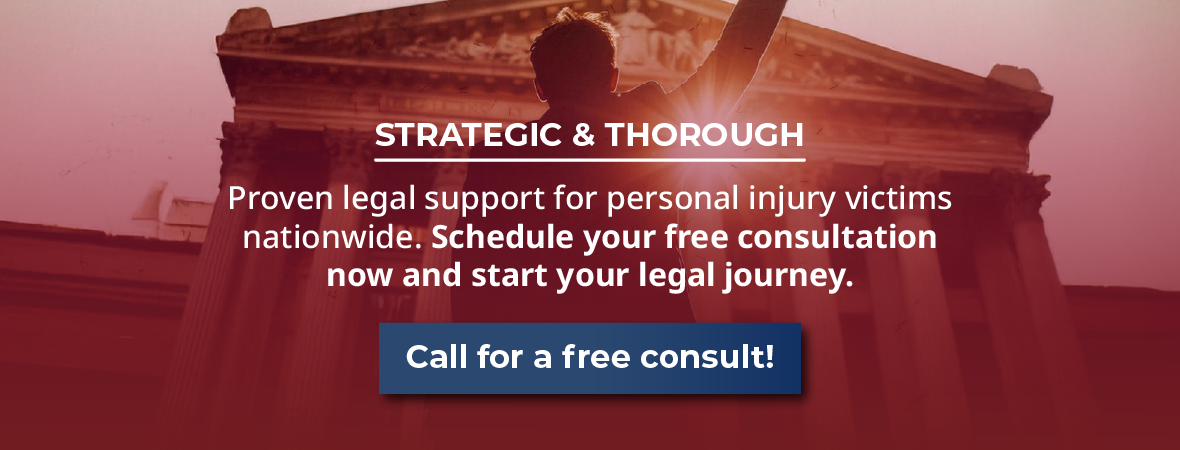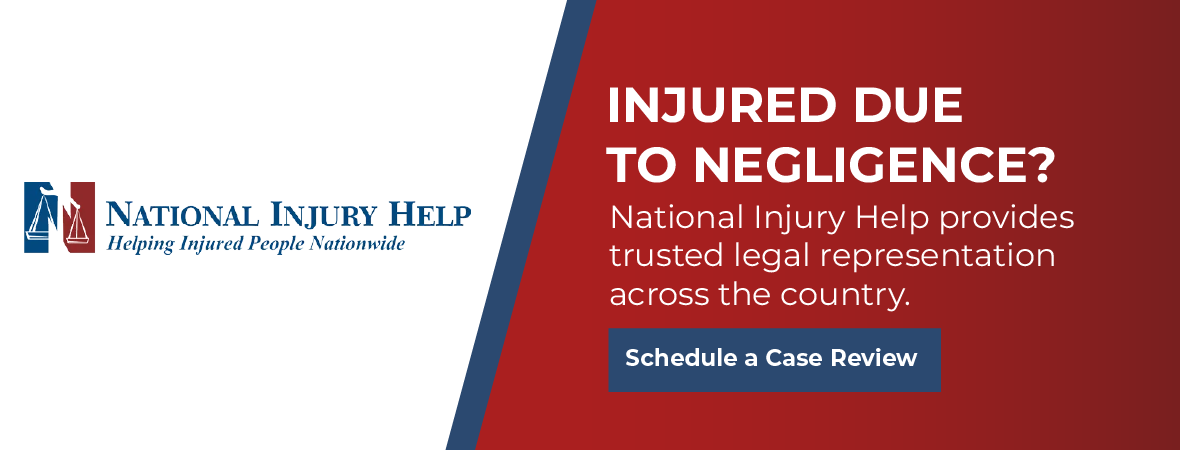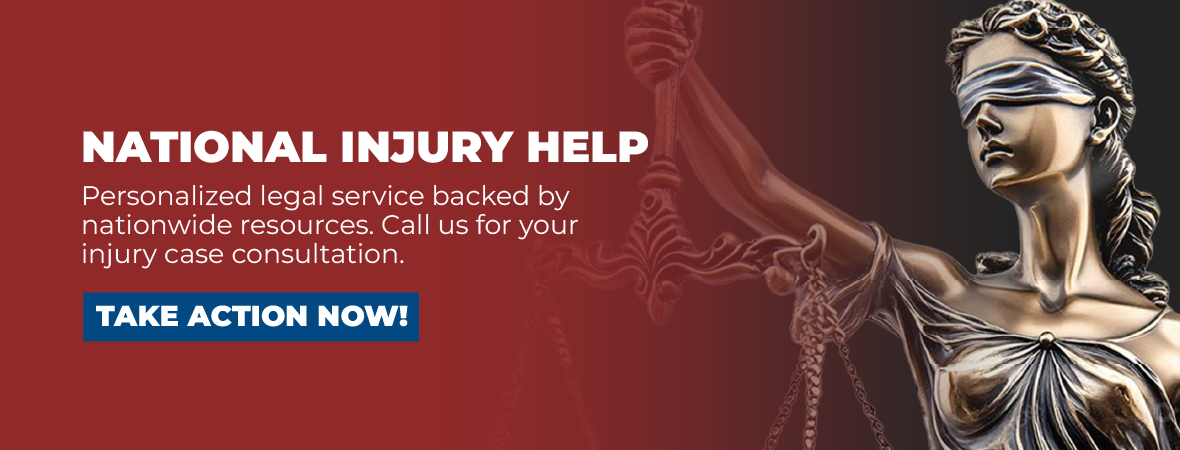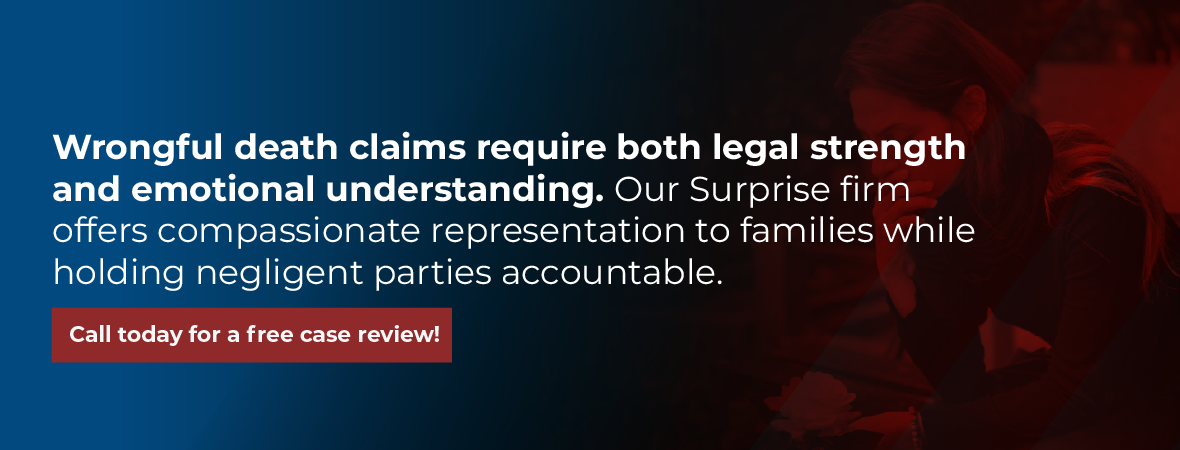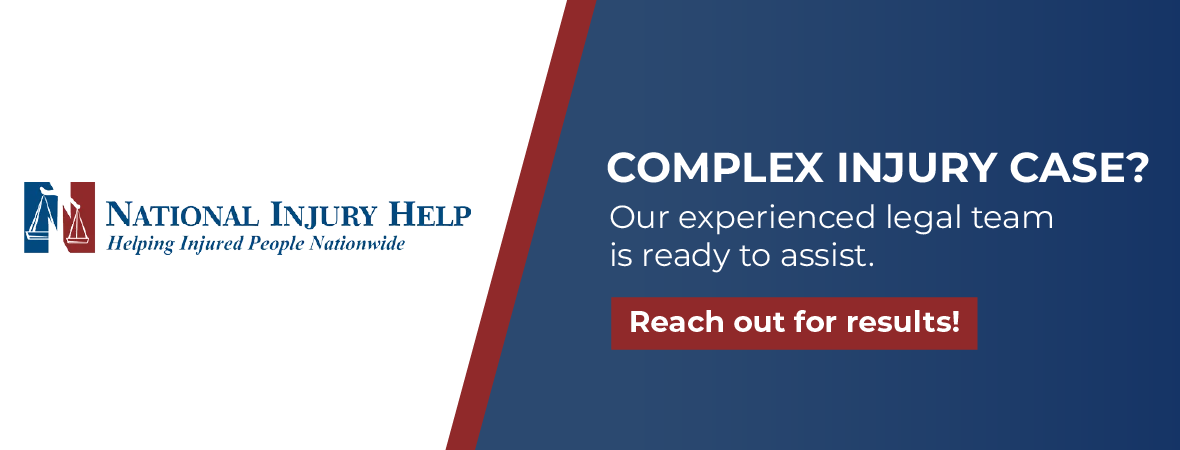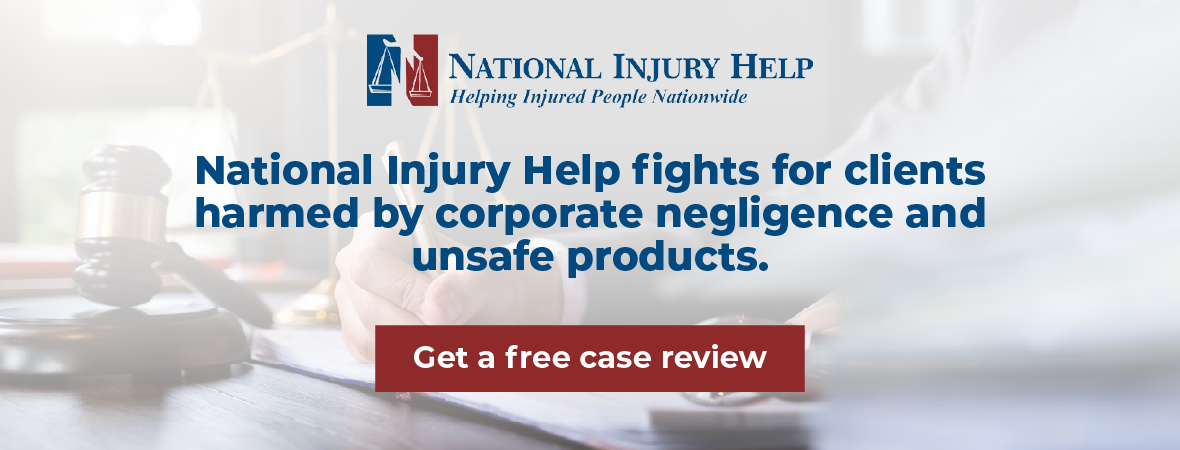Losing a loved one due to someone else’s actions is a heartbreaking experience. Contact our team of National Injury Help wrongful death attorneys by calling 1 (800) 214-1010 today.
Grief changes daily life in ways few people can imagine until it happens. Someone you relied on for laughter, advice, and steady encouragement is suddenly gone because another person chose to drive recklessly, ignored safety rules at a jobsite, or failed to follow basic medical standards.
Your family now faces shock, funeral bills, and an empty chair at the dinner table. Arizona lawmakers recognize that emotional loss often accompanies significant financial loss. State law allows certain relatives to file a wrongful death claim so the people or businesses that caused the tragedy carry the monetary weight instead of the surviving family.
Hiring an attorney who lives and works near Surprise, Arizona, puts you in a stronger position. A local lawyer knows how the Loop 303 accident reports read, which reconstruction experts the Maricopa County courts trust, and what steps insurers take when they know a family feels pressure to accept the first offer. We are here to guide your family with care and help you seek justice and financial support.
What Qualifies as Wrongful Death in Arizona?
Every state sets its own rules for civil claims after a fatal event. Arizona statute section 12-611 says a wrongful death occurs when a person dies because someone else either acted carelessly, recklessly, or on purpose. The claim exists to replace the lawsuit the victim would have filed if he or she had survived.
Legal Definition of Wrongful Death
A wrongful death arises when a death would not have happened but for another party’s failure to use reasonable care. That party might be a speeding driver, a doctor who failed to diagnose a clear illness, a manufacturer that put a defective airbag on the market, or a property owner who ignored a broken stair rail. The focus stays on whether the defendant breached a legal duty owed to the deceased.
Civil Cases versus Criminal Cases
A wrongful death claim is civil. It seeks money, not jail. Even if prosecutors never file charges or if a jury finds a defendant not guilty in criminal court, a family may still win compensation in civil court because the legal burdens differ. The criminal side demands proof beyond a reasonable doubt. The civil side asks only for a preponderance of evidence, more likely than not.
Statute of Limitations
Time moves quickly when funeral plans and estate tasks fill each day. Arizona gives two years from the date of death to file a wrongful death lawsuit. If the claim involves a public agency, such as a city truck or a state hospital, families must also file a notice of claim within one hundred eighty days. Missing those dates usually ends the right to recover.
Common Qualifying Incidents
Fatal car crashes on Bell Road, surgical errors in local hospitals, unsecured scaffolding at construction sites, and defective smoke alarms in new subdivisions all create legal grounds. Any event where negligence, recklessness, or intentional harm leads to death can qualify.
Who Can File a Wrongful Death Claim in Surprise, Arizona?
Losing a loved one is unimaginable, especially when the death results from someone else’s negligence or intentional actions. Amidst grief, families often wonder who has the legal right to file a wrongful death claim.
Arizona law restricts eligibility to specific individuals. Knowing who qualifies helps streamline the legal process, protect the family’s interests, and avoid unnecessary disputes.
Statutory Claimants Under Arizona Law
Arizona’s wrongful death statute (A.R.S. § 12‑612) clearly lays out who may bring a lawsuit. Only certain individuals are eligible to file:
A. Surviving Spouse
- The surviving husband or wife has the primary right to file.
- This applies regardless of whether the marriage was formal or common-law, as long as it is legally recognized in Arizona.
- If the spouse chooses not to file, they may join with other eligible parties.
B. Children
- All biological or legally adopted children may file.
- The law treats adopted children the same as biological children.
- Stepchildren and foster children are not automatically eligible unless legally adopted.
- Both adult and minor children have the right to file.
C. Parents or Legal Guardians
- If the deceased had no surviving spouse or children, the parents are next in line.
- This includes biological and adoptive parents.
- Grandparents, siblings, or extended family members cannot file in this category.
D. Personal Representative of the Estate
- When no spouse, children, or parents come forward, or when claimants prefer to proceed through an estate administrator, a personal representative (PR) may file.
- The PR is appointed through probate proceedings and can include:
- A surviving spouse or adult child,
- Another family member,
- Or a neutral fiduciary such as an attorney or professional trustee.
- The PR must file on behalf of the estate and all entitled beneficiaries.
- Unlike heirs, PRs do not need to have a personal relationship to file.
Consolidated Suits: Multiple Claimants in One Case
When more than one person qualifies to bring a claim, Arizona law encourages them to unite their efforts into a single lawsuit. This avoids duplicate legal costs, inconsistent verdicts, and emotional tension between family members.
Benefits of Filing Together
- Efficiency: Only one set of court filings, court fees, and attorney fees.
- Uniform compensation: Damages are allocated in one judgment, preventing conflicting orders.
- Shared evidence: Witness statements, medical records, and expert reports serve all claimants.
- Emotional support: Working together might feel less overwhelming than isolated legal battles.
Choosing a Lead Plaintiff
When multiple family members want to file, they generally appoint:
- A surviving spouse, if one exists;
- The personal representative, who speaks on the estate’s behalf.
All eligible parties must be listed in the lawsuit. The PR can also help monitor settlement discussions, ensuring fair distribution among heirs.
Filing on Behalf of Minor Children
Minor children cannot independently bring suit. Instead, legal actions are taken by:
- A surviving parent,
- Or an appointed legal guardian.
Lawyers use structured settlements for minor children to protect their financial interests: - Funds are placed in trust or annuity until the child reaches the age of majority (18 in Arizona) or a custom age agreed upon by the court.
- Courts may also allow limited early access for essential life expenses, tuition, therapy, medical costs, or support, under strict oversight.
Excluded Claimants: Who Cannot File
Serious misunderstandings arise when well-meaning relatives, such as siblings, grandparents, domestic partners, or close friends, assume they have the right to bring a claim. In Arizona, these relationships are not enough:
- Siblings and grandparents have no direct claim rights unless they also serve as personal representatives of the estate.
- Domestic partners or fiancés receive no rights unless their financial dependency is recognized through adoption or estate appointment.
- Non-family members, including close friends or financial dependents, must rely on a PR to represent their interests through the estate claim.
- Arranging conflicting lawsuits is costly and often quickly dismissed due to limited eligibility.
Understanding Each Claimant’s Role
Damages in a wrongful death case are not split evenly. Courts decide distribution based on each claimant’s loss.
Spouse
Compensates for:
- Loss of financial support,
- Emotional companionship,
- Services and day-to-day assistance,
- Shared household contributions and plans.
Children
May recover for:
- Loss of guidance, nurture, and parental support,
- Emotional distress and trauma,
- Potential future educational or vocational assistance,
- Reduction in inheritance or financial stability.
Parents
May claim:
- Funeral and burial costs,
- Loss of physical and financial support,
- Emotional pain is tied to the death of a minor or adult child.
Estate
May recover:
- Medical expenses before death,
- Burial and funeral costs,
- Loss of income that the deceased would have earned,
- Any financial value of their estate lost due to the incident.
A well-structured lawsuit ensures each eligible party receives full and fair compensation, based on their relationship and losses.
Why the Right Claimant Needs to File the Claim
Filing through the correct person ensures:
- All legal steps follow statutes,
- Settlements/judgments are legally sound and easily distributed,
- Creditors can be dealt with in probate,
- Future disputes are minimized because the court recognizes who was entitled to bring the claim all along.
Surprise Wrongful Death Attorney Explains Common Challenges in Wrongful Death Claims and Solutions
Navigating the complexities of wrongful death claims can be overwhelming for families already grappling with profound loss. Our team of skilled Surprised-bades wrongful death lawyers can provide essential guidance, helping to illuminate the common challenges faced in these cases. In this section, we’ll explore these obstacles and the effective solutions available to ensure that families receive the justice and compensation they deserve during such difficult times.
Disputes Among Survivors
When a spouse and children disagree, courts promote unity. Family attorneys facilitate agreements, often naming a personal representative to submit the suit and allocate compensation afterward.
Minor Children Require Special Protections
Courts take extra care with minors. Funds are protected in trust, distributed under court supervision, and used as intended, for education, health, or well-being.
Missing Spouses or Parents
If no spouse or children survive, locating and naming eligible parties is crucial. The PR may file, but every beneficiary must be identified to allow notice and proper inclusion in the distribution.
Conflicting Estate Claims
When the estate lacks a PR or beneficiaries cannot agree, a probate court may appoint an independent fiduciary to file the wrongful death claim impartially and allocate resources in compliance with the law.
Leading Causes of Wrongful Death in Surprise, According to a Surprise Wrongful Death Attorney
Surprise blends suburban neighborhoods with busy highways, active construction zones, and a growing healthcare network. Each environment carries unique risks that can lead to fatal incidents if people fail to follow safety rules.
Fatal Car Accidents
Loop 303, Grand Avenue, and Greenway Road see more traffic every year. High speeds, impatient lane changes, and distracted driving make collisions on these roads severe. When airbags, seat belts, and road barriers cannot overcome reckless choices, wrongful death claims follow.
Medical Malpractice
Hospitals and outpatient clinics in the Northwest Valley treat thousands of patients. A single missed lab result, a slip of the scalpel during surgery, or a delayed C-section can push a healthy person into a fatal crisis. Expert testimony from doctors outside the local network often proves that the standard of care was not met.
Construction and Workplace Accidents
New retail centers and housing developments line Bell Road. Crews use cranes, nail guns, and temporary electrical lines.
A loose harness or an exposed wire can kill in seconds. Workers’ compensation pays basic benefits, yet families may also sue third parties such as equipment suppliers or subcontractors for full wrongful death damages.
Defective Products and Unsafe Premises
Everything from faulty space heaters to poorly maintained stairwells poses a fatal risk. Manufacturers must design, test, and warn. Property owners must inspect and repair. When they fail, civil liability fills the gap left by inadequate safety measures.
Fatal Motorcycle or Pedestrian Collisions
Wide intersections and limited street lighting create blind zones. Drivers who roll through right turns or speed during rush hour may never see a motorcyclist or a pedestrian until impact. Helmets and crosswalk signals help, but they cannot stop a multi-ton truck moving too fast.
Types of Compensation Our Team of Surprise Wrongful Death Attorneys Can Help Families Recover
Wrongful death claims in Arizona (under A.R.S. § 12-611 to 12-613) allow certain family members to seek compensation for a wide range of losses. These damages fall into three main categories: economic, non-economic, and, in limited cases, punitive.
Economic Damages: Calculating Measurable Financial Losses
Economic damages are often the most immediate and quantifiable component of a wrongful death claim. They address the financial consequences that come with losing a family member who contributed to the household, whether through direct income or unpaid labor.
1. Funeral and Burial Expenses
These are among the first costs that families face. In Arizona, reasonable funeral and burial expenses are recoverable and may include:
- Funeral home services
- Casket or cremation costs
- Headstones and cemetery plots
- Clergy or celebrant fees
- Transportation and flower arrangements
Depending on the services selected, these costs can exceed $10,000.
2. Medical Bills Prior to Death
If the deceased received emergency medical care, hospital treatment, or surgeries before passing, those expenses often fall on the surviving family or estate. These bills may include:
- Ambulance transport
- Emergency room fees
- Surgical procedures
- ICU stays
- Diagnostic imaging (MRI, CT scans)
- Medication and palliative care
Even short-term attempts to save a life can generate six-figure hospital bills.
3. Loss of Income and Benefits
The most substantial part of economic damages is often the loss of future income the deceased would have earned over their lifetime. This includes:
- Salary and wages
- Bonuses and commissions
- Employer-paid health and life insurance
- Contributions to retirement accounts or pensions
- Vacation or sick leave
- Stock options or profit-sharing plans
To calculate this accurately, attorneys often retain forensic economists who analyze:
- Age and life expectancy of the deceased
- Education and job history
- Career advancement prospects
- Industry salary data and inflation trends
For example, a 38-year-old engineer with two children and 25 years of expected work left may leave behind millions in projected lost income and benefits.
4. Loss of Household Services
Not all contributions are financial. Stay-at-home parents, caregivers, and retirees often perform vital services that would be costly to replace:
- Childcare
- Meal preparation
- Cleaning and laundry
- Home maintenance
- Transportation
- Elder care or special needs care
Arizona law allows the value of these lost services to be included in the claim, and expert testimony may estimate how much it would cost to outsource those tasks.
Non-Economic Damages: Valuing Emotional and Relational Loss
Non-economic damages capture the personal loss—the deep grief and disruption to family life that cannot be measured by receipts. Though subjective, these damages are real and often recognized generously by Arizona juries.
1. Loss of Love and Companionship
A spouse loses not just income but a partner for shared life plans. Arizona allows recovery for:
- Emotional support
- Intimacy and affection
- Advice and comfort
- Shared routines and companionship
This category covers everything from the quiet comfort of morning coffee to shared vacations or life planning.
2. Loss of Parental Guidance
Children who lose a parent miss out on more than bedtime stories. They also lose:
- Advice on school and relationships
- Moral and educational guidance
- Help with college applications or job decisions
- Future support through life milestones
Whether the child is three or thirty, the absence of a parent echoes for decades.
3. Loss of Care and Nurture
For minor children or dependent adults, non-economic damages also consider the absence of hands-on parenting or caregiving. This is especially relevant when the deceased was a primary caregiver.
4. Grief and Mental Anguish
Though Arizona law does not provide a specific formula, courts may award compensation for the psychological impact of the loss, including:
- Depression
- Anxiety
- Trauma from witnessing the death
- Sleeplessness or loss of appetite
- Suicidal thoughts or social withdrawal
Supporting documentation from therapists or mental health providers can strengthen this part of the wrongful death claim in Surprise.
Punitive Damages: Punishing Egregious Misconduct
Punitive damages are not awarded in every case. Unlike economic and non-economic damages, which are compensatory in nature, punitive damages aim to punish defendants for particularly egregious conduct and to deter similar future behavior.
When Punitive Damages May Apply
Arizona courts may consider punitive damages when the defendant acted with:
- Gross negligence
- Malice or intent to harm
- Reckless disregard for public safety
Examples include:
- Drunk driving well above the legal limit
- Texting while driving at highway speeds
- Selling or shipping products with known fatal defects
- Nursing homes ignoring repeated abuse reports
Punitive awards can be substantial, especially when the defendant is a corporation with deep pockets. However, they require strong evidence, often including prior violations or a pattern of misconduct.
Damage Calculations: How Courts and Jurors Decide
Judges and juries consider many factors when determining damage amounts:
- Age and health of the deceased
- Income and education
- Relationship to surviving family members
- Number and age of dependents
- Degree of emotional and financial dependence
- The nature of the defendant’s misconduct (for punitive damages)
For example, a 40-year-old nurse with two children and a spouse may trigger higher economic and non-economic damages than an 85-year-old retiree. Yet that retiree’s deep bond with grandchildren, active volunteering, or daily caregiving duties can also command meaningful compensation.
How a Surprise Wrongful Death Lawyer Can Help
Grief consumes energy. Paperwork, investigations, and negotiations require focus. An experienced attorney assumes those tasks.
Thorough Investigation
An attorney secures police accident reconstruction files, 911 recordings, black-box data, and autopsy reports before they disappear or fade from memory. Expert witnesses in engineering, medicine, or human factors analyze the material and explain where safety rules failed.
Proving Liability
Legal duty plus breach plus causation equals liability. Lawyers link each element through photos, witness testimony, and record analysis. They counter defense arguments that blame the deceased.
Handling Insurance and Paperwork
Insurers seek quick closure. They send forms that seem harmless, yet waive rights or release defendants. Lawyers read every line, respond within deadlines, and keep adjusters from exploiting technical loopholes.
Negotiation and Litigation
Many claims settle through mediation. When offers do not reflect the full loss, a lawyer files a suit in court. Litigation pressures insurers and often raises settlement amounts before trial. If a trial becomes necessary, your attorney presents a clear, compassionate narrative to the jury.
Contingency Representation
Most wrongful death lawyers collect no upfront fee. They advance investigation costs and get paid a percentage only if they win money for the family. This model allows every family to seek justice, not just those with savings.
Surprise Wrongful Death Attorney Explains What to Expect During the Wrongful Death Claim Process
Legal timelines feel slow when grief feels urgent, but understanding each stage reduces uncertainty.
Consultation and Case Evaluation
The attorney listens to how the death occurred, explains eligibility, and outlines potential damages. Confidentiality protects every detail.
Investigation and Documentation
The firm orders reports, interviews witnesses, and preserves evidence such as vehicle parts or defective products. Medical experts review hospital records to confirm the cause of death.
Negotiation
The lawyer presents a demand letter with evidence and damage calculations. Insurers reply with offers. Back-and-forth continues until agreement or impasse.
Filing a Lawsuit
If no fair settlement appears, the attorney files a complaint. Discovery follows, where each side exchanges information. Mediation often happens again with judges urging compromise.
Timeline and Support
Some cases settle within six months. Complex matters with multiple defendants or disputed causation can take a year or longer. A good lawyer provides regular updates, answers calls promptly, and refers families to counseling and financial planning resources.
Contact a Surprise Wrongful Death Attorney
Losing someone you love because of another person’s negligence is heartbreaking. The emotional weight is heavy, and the financial impact can make things even harder. At National Injury Help, we understand that no amount of money can bring your loved one back. But pursuing a wrongful death claim can help secure justice, protect your family’s future, and hold the responsible party accountable.
If your family is grieving after a fatal accident in Surprise, Arizona, we are here to support you. Our legal team will listen to your story, answer your questions, and guide you through each step of the process. We work with compassion and urgency to gather evidence, interview witnesses, and build a case that truly reflects the loss your family has suffered.
There are strict deadlines for filing a wrongful death claim in Arizona. The sooner we begin, the more we can do to protect your rights and preserve critical evidence. You do not have to face this difficult time alone. We offer free consultations and charge no legal fees unless we win your case.
Let us handle the legal process while you focus on healing. Call 1 (800) 214-1010 today to speak with a fatal accident lawyer in AZ who will stand by your side and fight for the justice your loved one deserves.
We are ready to help your family find answers, accountability, and the compensation needed to move forward.





